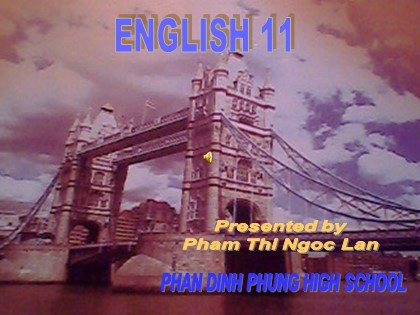Bài giảng Tiếng Anh Lớp 11 - Unit 14: Recreation - Part A: Reading
All work and no play makes Jack a dull boy”, goes an English saying. Recreation and entertainment are important to people everywhere in the world. However, forms of popular entertainment are different in different countries.
In Britain, the most common leisure activities are home based. Watching television is by far the most popular pastime, and nearly all households have a television set. Over 51 percent of households have two or more television sets and average viewing time for the population aged four and over is 25 hours a week. Other pursuits include listening to music, reading, do-it-yourself home improvements, and gardening.
British people are also very interested in watching and taking part in sports. Walking and swimming are the two most popular sporting activities, being almost equally undertaken be men and women. Snookers, pool and darts are the next most popular sports among men. The most popular spectator sports are football and rugby in winter, and cricket and athletics in summer.
In the last few years in Britain, a new trend has been developing, i.e., taking weekend or holiday courses. There is a enormous range of courses on offer. The course can be as simple as bricklaying or as sophisticated as making your own stock market decisions. For people who are interested in art, there are courses in painting or drawing. People who like music can take a course in karaoke singing. Courses like shoemaking or glass engraving provide people with practical skills they can do with hands. Those who want to improve their minds can take a course of “Living with more meaning”. Entry qualifications to weekend courses are generous, that is, generally no qualifications are necessary, apart from an ability to pay the fees, which may be quite high.
Tóm tắt nội dung tài liệu: Bài giảng Tiếng Anh Lớp 11 - Unit 14: Recreation - Part A: Reading

audience. Entry qualification ( n.p ): entry procedures NEW WORDS AND PHRASES READ THE TEXT AND LISTEN TO THE TAPE: UNIT 14: RECREATION “All work and no play makes Jack a dull boy”, goes an English saying. Recreation and entertainment are important to people everywhere in the world. However, forms of popular entertainment are different in different countries. In Britain, the most common leisure activities are home based. Watching television is by far the most popular pastime, and nearly all households have a television set. Over 51 percent of households have two or more television sets and average viewing time for the population aged four and over is 25 hours a week. Other pursuits include listening to music, reading, do-it-yourself home improvements, and gardening. British people are also very interested in watching and taking part in sports. Walking and swimming are the two most popular sporting activities, being almost equally undertaken be men and women. Snookers, pool and darts are the next most popular sports among men. The most popular spectator sports are football and rugby in winter, and cricket and athletics in summer. In the last few years in Britain, a new trend has been developing, i.e., taking weekend or holiday courses. There is a enormous range of courses on offer. The course can be as simple as bricklaying or as sophisticated as making your own stock market decisions. For people who are interested in art, there are courses in painting or drawing. People who like music can take a course in karaoke singing. Courses like shoemaking or glass engraving provide people with practical skills they can do with hands. Those who want to improve their minds can take a course of “Living with more meaning”. Entry qualifications to weekend courses are generous, that is, generally no qualifications are necessary, apart from an ability to pay the fees, which may be quite high. The words/phrases in italics in the following sentences all appear in the passage. Circle the correct answer. Task 1: 1 .The activities are home based . They are organised ....... A. at home B. outdoors C. In the basement of the house. 2 . Television viewing is by far the most popular pastime. This mean ....... A. People have to go very far to watch television. B. television viewing is much more popular than any other pastime. C. television viewing is as popular as other pastime. 3 . There are many different courses on offer . This means ....... A. there are many different courses on television. B. there are many different courses to be taken. C. there are many different courses that teach people to make offers. 5 . Spectator sports are.............. A. sports people take part in B. sports people often watch C. beautiful sports. 6. Entry qualifications are ........... A. necessary conditions for being admitted to the course. B. ability to pay the fees. C. entry examinations. The words/phrases in italics in the following sentences all appear in the passage. Circle the correct answer. Task 1: 4 .Besides watching television, people have other pursuits . This means........ A. besides watching television, people have other leisure activities. B. besides watching television, people have to work. C. besides watching television, people don’t enjoy anything else. Answer the questions 1 . Why are recreation and entertainment important to people? Task 2: Because without them people will become dull/bored. 2 . What sports do the British like watching? Football and rugby in winter; cricket and athletics in summer. 3 . What sports do they like taking part in? Walking and swimming. 4 . Why do many British people take weekend courses? Because this is a new kind of entertainment which gives them pleasure. “All work and no play makes Jack a dull boy”, goes an English saying. Recreation and entertainment are important to people everywhere in the world. However
File đính kèm:
 bai_giang_tieng_anh_lop_11_unit_14_recreation_part_a_reading.ppt
bai_giang_tieng_anh_lop_11_unit_14_recreation_part_a_reading.ppt

